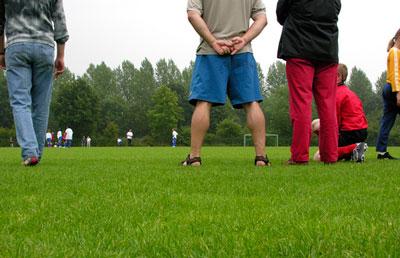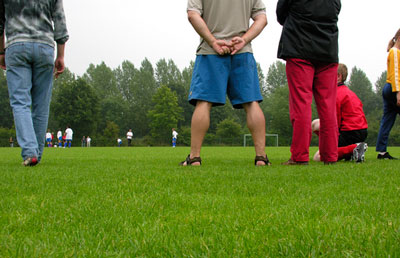
Mar 27, 2017 • 4 min read
Dealing with Difficult Parents on the Sidelines
Posted in:
In a perfect world, we all show up to our young athlete’s sporting events to encourage them lovingly. When they do well, we give a polite golf clap. When they have a mishap, we smile and remember that they are only kids, learning one play at a time.
Ha!
Here’s the real story: Parent behavior on the sidelines runs the gamut from the disinterested dad reading the paper while his kid is batting to over-the-top mom screaming at the ref for a missed foul. I am sure many of us have stories to tell about what we’ve seen at our kids’ sporting events. I know I have way too many!

So, as a sports parent, how do you deal with difficult parents? Here are some suggestions that have worked for me:
1. You Can’t Beat Them, but You Don’t Have to Join Them!
I have been known to get caught up in the moment and get carried away verbally. It is usually when my child has done something well, and I over-cheer. Or it’s when a child on the other team is being too aggressive and it feels like the ref isn’t calling it. Whatever the case may be, it’s dangerous to start getting too verbal. Whether you realize it or not, you become one of those parents. I have taken a Sideline Vow of Silence because it is better to say nothing at all than to accidentally get caught up in the moment and say things you might regret. Maybe the other (more verbal) parents will follow your lead! (Of course, if your child really is in danger, you need to pipe up, but for general sideline behavior, less is more.)
2. Separate Yourself From the Pack
Do yourself a favor and do not sit next to the loud, obnoxious parents. Politely find a quiet spot under a nice tree and enjoy watching your child without the influence of inappropriate behavior. Afraid you will look like you don’t want to socialize? Good! That’s the message you are trying to subtly send!

3. Coach
If you choose to coach, you put yourself in a position where you can (often) select or draft the kids on your team. Choose kids with parents who are not difficult. You might not have the best team in town according to your wins and losses record, but you will have a much more peaceful experience. (Note to difficult parents: If you continue to be obnoxious, coaches will stop choosing your child!)
4. Talk With the Coach
Last year, my son’s coach sent around a “Parent Code of Conduct” we all had to sign before the season started. It was his way of expressing early on that he did not want to deal with difficult parents. If your coach has not done something like this, perhaps you can suggest it to him or her. That way, the message to “be nice” will come from the coach and not from other parents.
5. Move On
If your child’s youth sports experience is being ruined by a bad batch of parents, move on! Life is too short! Check out neighboring towns or other leagues, or start a club team. The goal is to provide your young athlete with opportunities to explore his or her interests in different activities, not to subject your entire family to difficult parents. Of course, there are difficult parents everywhere, but sometimes, bad behavior breeds bad behavior, and finding a new team (and different parents) might be the solution.
Erica Salmon is a TeamSnap mom, often seen on the sidelines of youth soccer, baseball, field hockey and basketball games as well as at dance recitals, concerts and art shows. Erica is a book author, former fashion analyst for NBC10 (Philadelphia) and the founder of several Websites and blogs including Fantasy Fashion League and Red Carpet Mom. Erica lives in Mullica Hill, NJ, with her husband, three children and their enormous dog Elvis.
For more on how can we stop bad sports parent behavior, listen to this episode of the TeamSnap Youth Sports Podcast. John Engh, COO of the National Alliance of Youth Sports (NAYS), discusses parents on the sidelines and how we can keep youth sports positive and beneficial to its athletes.
